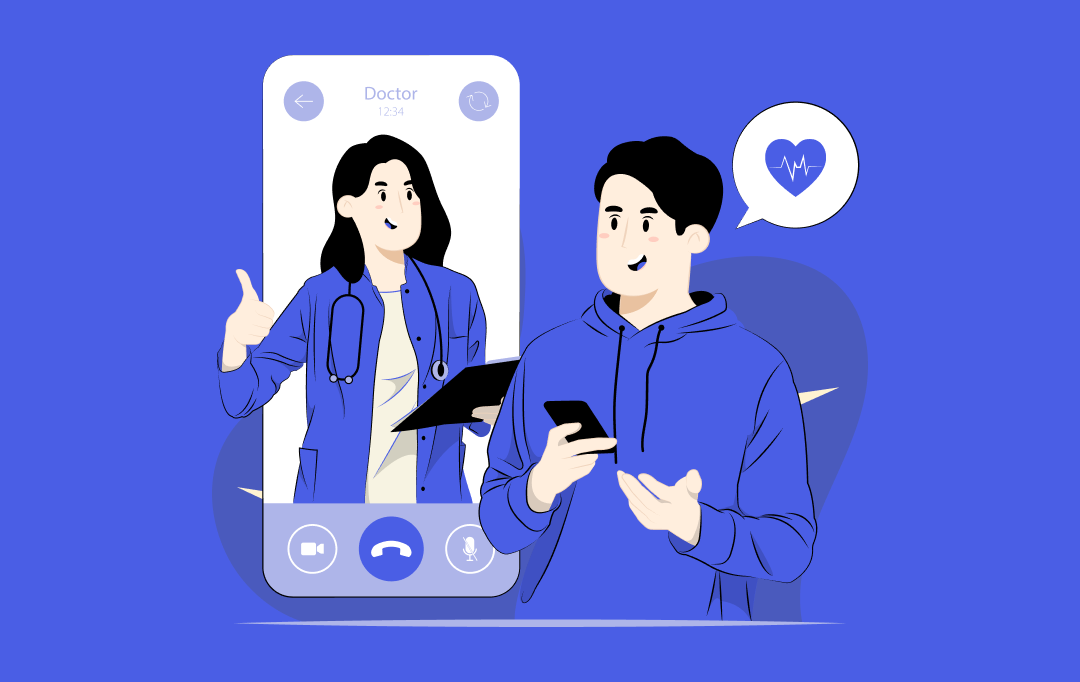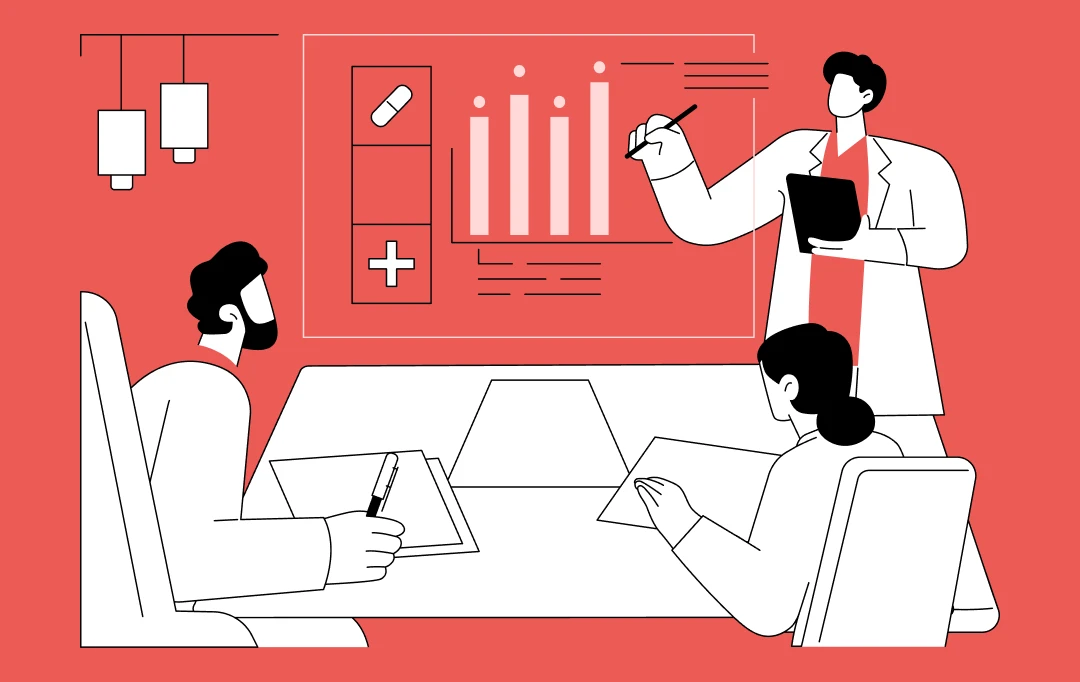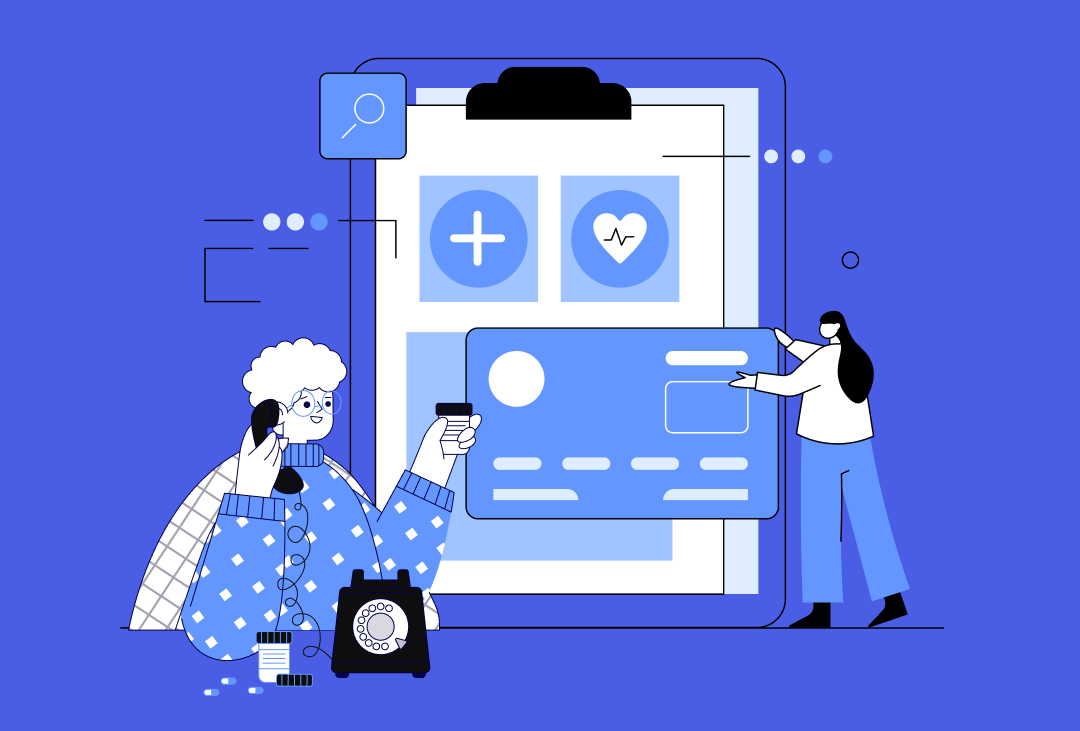- A Brief Summary of Doctolib and Its Market Value
- The Growing Digital Healthcare Market Landscape
- Decoding the Cost to Develop an App Like Doctolib
- Factors Impacting the Doctolib App Development Costs
- UI/UX Design
- Location of the App Development Firm
- Technology Stack
- Regulatory Compliance
- Integration with External Systems
- Ongoing Maintenance
- Development Team Type
- The Platform for App Development
- App Features
- Features to Create an App Like Doctolib
- Essential Features for the Patients
- Essential Features for Practitioners
- Understanding the Doctolib App Development Process
- App Ideation
- Hiring an App Development Firm
- UI/UX Design
- App Development
- Testing and Quality Assurance
- App Deployment and Maintenance
- How Can Businesses Earn Money after Developing an App Like Doctolib?
- Subscription Revenue
- Telemedicine Appointment Fees
- Integration Charges
- Advertising Opportunities
- How Can Appinventiv Help You Revolutionize Healthcare Access in the European Market?
- FAQs
When it comes to the European healthcare industry, the increased proliferation of mobile applications has redefined the way healthcare services are accessed and delivered to people across the continent. At the forefront of this digital revolution is Doctolib, a healthcare app that has become a cornerstone in reshaping the region’s economy.
Doctolib’s innovative business model has positioned itself as a leader, offering a seamless platform that connects patients with healthcare providers, streamlines appointment scheduling, and facilitates advanced medical care. The popularity of the medical app can be further attributed to its user-friendly interface, real-time availability updates, and the wide range of healthcare professionals accessible through the platform.
Being one of the top three providers of online medical consultations globally, Doctolib serves more than 300,000 medical professionals and workers as its users.
If you are a business looking to venture into the virtual healthcare industry after considering the tremendous success of the European startup, the most vital question you need to address is how much does it cost to develop an app like Doctolib. Well, to give you a rough range, the Doctolib app development cost can range from $40,000 to $300,000. This blog will provide deep insights into the various factors that influence the costs.
In addition to this, we will also look into a step-by-step process to create a robust medical app similar to Doctolib and the features that can guarantee maximum ROI. So, let’s dive headfirst into the details.

A Brief Summary of Doctolib and Its Market Value
Doctolib was founded in 2013 to enhance the accessibility and efficiency of healthcare for both patients and professionals. Initially established as an appointment scheduling platform for doctors, the app now offers telemedicine services, allowing patients to schedule video or phone appointments with the desired healthcare team/professional.
The medical app facilitates messaging between patients and doctors, promoting continuous communication. Furthermore, Doctolib has also enhanced its capabilities for back-office management, providing healthcare professionals with tools to manage patient records, billing, and scheduling efficiently.

With a mission to “make healthcare more human,” Doctolib has been able to raise funding of over $815 million from multiple investors. Certain reports further suggest that the healthcare startup now ranks as one of Europe’s leading digital platforms that will IPO in 2024.
The medical app now serves more than 60 million users across Germany, France, and Italy while looking to dominate other global markets quickly.
The Growing Digital Healthcare Market Landscape
According to Grand View Research, the digital healthcare market in Europe was valued at $45.3 billion in 2022 and is expected to reach $145.9 billion in 2030, witnessing a CAGR of 16% from 2023 to 2030. The increasing market share can be attributed to the rising prevalence of chronic diseases and a shortage of medical professionals. In addition to this, the increasing demand for virtual healthcare services is expected to fuel the market size.

Thus, considering this positive trajectory, now is the right time for businesses in the region to explore and invest in healthcare apps that meet the growing demand for innovative and streamlined healthcare solutions while guaranteeing maximum ROI.
Also Read: 15 types of healthcare software you can use to take your medical business to the next level
Decoding the Cost to Develop an App Like Doctolib
As mentioned above, the cost to develop an app like Doctolib can vary from $40,000 to $300,000. Several factors influence the development cost, including the overall app complexity, the choice of the technology stack, the features to be integrated into the app, the hourly rate of development, the development time frame, etc.
To give you a rough understanding of the budget needed to be planned before, consider talking to a dedicated app development company like Appinventiv that can help you map out the details while offering custom quotes.
It is vital to understand that developing a medical appointment app with higher complexity and an extensive feature set will ultimately cost you more than an app with simple features and lesser complexity.
| Simple | $40,000 to $65,000 | 5 to 6 months |
| Medium Complex | $90,000 to $160,000 | 8 to 9 months |
| Highly Complex | $180,000 to $300,000 | 12+ months |
Let us try and help you understand the multiple factors that can impact the app like Doctolib development costs.
Factors Impacting the Doctolib App Development Costs
To navigate the medical appointment app landscape, it is vital to factor in multiple aspects that can impact the overall cost to build an app like Doctolib. Let us look at them in detail below.

UI/UX Design
The complexity of the UI and UX design substantially impacts the cost of developing an app like Doctolib. Creating an intuitive design that offers smooth navigation and an appealing interface can help retain users while increasing engagement. Understanding that visually appealing design can impact the overall app value and development costs is vital.
Location of the App Development Firm
The geographical location of the hired app development firm plays a crucial role in determining the overall Doctolib app development costs. The hourly development rates vary as per the multiple regions. For instance, hiring a development firm in the US or UK will cost you more than hiring a firm in Asia or Europe.
| Region | Estimated Hourly Rate of Development |
| Eastern Europe | $50 – $60 |
| Asia | $30 – $40 |
| Latin America | $70- $85 |
| Africa | $30 – $40 |
Technology Stack
The choice of technology stack which includes the programming languages, frameworks, and tools, also impacts the overall cost to develop an app like Doctolib. Opting for advanced technologies can impact the overall app functionality, making it stand against the toughest competitors in the healthcare sector.
 s
s
Regulatory Compliance
Healthcare apps must adhere to stringent regulatory standards and data protection laws like HIPAA. Ensuring data security, privacy, and regulatory compliance adds to the overall complexity and thus increased Doctolib app development costs.
Integration with External Systems
Integrating the app with external systems like electronic health records (EHRs) adds to the overall complexity of the app. Seamless interoperability requires additional efforts, impacting the overall budget to develop a medical appointment app like Doctolib.
Ongoing Maintenance
Ongoing maintenance is critical for making your app scale as the user base grows. Regular updates, bug fixes, and support contribute to the total cost to develop a medical appointment app like Doctolib.
Development Team Type
The composition of the development team, whether in-house, freelance, or outsourced, affects costs differently. Each approach has its financial implications that can affect the overall medical appointment platform development costs.
It is vital to understand that partnering with a proficient outsourcing app development team allows businesses to tap into a pool of skilled professionals with specialized knowledge, leading to efficient development processes and cost-effectiveness.
The Platform for App Development
The choice of platforms, such as iOS, Android, or cross-platform development can impact the cost to build an app like Doctolib. To keep the overall development expenditure in check, it is advised to choose a single platform for development at the initial stage and move towards a cross-platform app after the app has gained traction in the market.
App Features
The complexity and number of features integrated into the app directly impact the cost to develop an app like Doctolib. If you wish to integrate more intricate functionalities, the requirement of additional resources by the development team will contribute to a higher overall expense.
Also Read: Cost to develop a medical networking app like Doximity: Redfining LinkedIn for Doctors
Features to Create an App Like Doctolib
It is essential to incorporate fundamental functionality to develop a medical appointment app like Doctolib. Let us look at multiple Doctolib app features you can incorporate to achieve maximum ROI. Do remember that these features will directly impact the medical appointment app development cost. Thus, it is advisable to choose wisely if you wish to offer major traction to your app.
Essential Features for the Patients

Appointment scheduling and management: Efficiently book and manage medical appointments.
Search practitioners: Easily find suitable healthcare providers as per location, specialization, and experience
Push Notifications and Alerts: Stay informed with timely reminders and notifications.
Automated scheduling: This helps the users in streamlining the appointment scheduling process.
Slot checker: Allows the patients to quickly identify and book available time slots.
Booking management: Keep track of all booked appointments in one place.
Calendar sync: The users can easily sync appointments with their personal calendars on their smartphones.
Health profiles: This allows the users to manage health profiles for themselves and family members.
Treatment tracker: The patients can monitor and track ongoing treatments at any time of the day.
AI chatbots: The user can contact intelligent chat support for basic inquiries.
Rewards: The app allows the users to earn rewards and points for loyalty or engagement.
Essential Features for Practitioners

Staff management: This allows the healthcare team/practitioner to manage healthcare staff and their roles efficiently.
Appointment manager: This allows the practitioner to organize and oversee scheduled appointments.
Inventory management: This allows the user to keep track of medical inventory and office supplies.
Patient records: This feature makes way for efficient storage, management, and secure tracking of patient records.
Data sharing: This allows the practitioner to have secure access and sharing of patient information.
Follow-up management: This streamlines the patient follow-up procedures.
Invoice tools: This feature allows the users to generate and manage patient invoices efficiently.
Historical records: The doctor can access the patient’s history to get insights into certain conditions.
Now that you have looked into the multiple Doctolib app features for both patient and doctor’s interface, let us move ahead and look at the process of medical appointment app development like Doctolib.
Understanding the Doctolib App Development Process
Here are the multiple steps that can help you navigate the complexities of developing a medical appointment app like Doctolib and offer a valuable solution to users in the healthcare ecosystem.

App Ideation
During this phase, it is essential to conduct market research to identify user needs and competitors. This will allow you to conceptualize the medical appointment app effectively. By defining the app’s purpose and core functionalities, ensure that it meets the requirements of your target audience.
Hiring an App Development Firm
Before initiating the actual Doctolib app development process, hiring a dedicated app development firm is crucial. Ensure that the chosen firm specializes in healthcare app development. Take the time to review their portfolios and assess their expertise.
UI/UX Design
Detailed wireframes and mockups are created during this phase to establish the app’s UI/UX. This process involves carefully designing the visual layout and functionality of the app, ensuring a seamless and intuitive user journey. This blueprint serves as a guide for the subsequent development phase, ensuring a solid foundation.
App Development
The design specifications are transformed into a functional app during the coding phase. This involves developing the backend infrastructure for data storage and user authentication tasks. Additionally, front-end components are implemented to ensure a seamless user experience.
[Also Read: The Ultimate Business Guide to Healthcare Application Development]
Testing and Quality Assurance
Thorough testing is imperative to identify and resolve bugs, usability issues, and performance concerns. Functional testing guarantees the proper functioning of all features, while security testing safeguards user data and privacy.
App Deployment and Maintenance
In this phase, the app is deployed on relevant platforms, such as the iOS App Store and Google Play Store. Ongoing maintenance is crucial after the app launch to address any issues that may arise, ensuring the app’s performance and user satisfaction.
How Can Businesses Earn Money after Developing an App Like Doctolib?
There are multiple ways you can monetize your medical appointment app similar to Doctolib. It is vital to understand that refining your revenue model as per the changing market trends can help you stay competitive while establishing a constant source of revenue.

Subscription Revenue
You can generate a reliable source of income by implementing a subscription fee model for healthcare practitioners who wish to utilize your platform. By offering a selection of plans with different features, you can effectively cater to the diverse needs of these practitioners.
Doctolib, the medical appointment booking platform uses a subscription-based model to generate revenue. The app generates money primarily through its services and charges practitioners and hospitals subscription fees starting at €139 per month. The charges further vary as per the size of the practice or institution.
Furthermore, an add-on subscription plan offered by the platform allows the doctors to make telehealth appointments. It costs around €79 per month.
The company emphasizes that it doesn’t monetize patient data and is free for the patients to use, make appointments, etc.
Telemedicine Appointment Fees
To monetize telemedicine services, practitioners could be charged for virtual consultations, video appointments, and other remote healthcare offerings. It is important to establish transparent pricing for these services in order to attract users.
Doctolib app also generates revenue by taking a commission from the consultation fees when patients book appointments with healthcare professionals through its platform.
Also Read: How Much Does Telemedicine App Development Cost?
Integration Charges
You have the opportunity to generate revenue by charging fees for platform integration with various healthcare systems, payment gateways, and third-party services. It is crucial to prioritize seamless integration and offer value-added services to maintain a competitive advantage.
Advertising Opportunities
To monetize your platform, you can explore advertising opportunities and partnerships with pharmaceutical companies or healthcare-related businesses. You can generate revenue and reach a wider audience by offering targeted advertising space and promotional collaborations.
How Can Appinventiv Help You Revolutionize Healthcare Access in the European Market?
We hope our blog has helped you understand the intricacies regarding the cost to develop an app like Doctolib. If you are ready to invest in an app similar to Doctolib, it is vital to understand that hiring an app development firm can not only help you design a well-crafted app but also help you enhance healthcare accessibility while contributing to a seamless and efficient patient-doctor experience.
As a dedicated Android app development company, our experts can offer you custom solutions to propel your business in the healthcare industry. With a well-known background in medical software development services, we excel in creating bespoke solutions tailored to the unique needs of clinics and healthcare providers alike.
Our expertise extends to the seamless integration of cutting-edge technologies, ensuring that medical appointment apps are equipped with AI-driven features, secure telemedicine functionalities, robust data analytics, etc.
We recently developed an AI-powered healthcare platform, YouCOMM, that allows patients to connect with the hospital staff just with the help of hand gestures and voice commands. The platform has been adopted across 5+ hospital chains across the US and has contributed to a 60% reduction in nurses’ response time.

The custom-made personal wellness mobile app, Soniphi, uses 94% of the vocal information offered by the users to offer a complete well-being analysis report. The app is now the first platform using resonant frequencies to deliver accurate results.

Get in touch with experts to begin your journey to innovative healthcare solutions.
FAQs
Q. How can businesses hire a dedicated firm for developing an app like Doctolib?
A. Businesses can hire a dedicated firm for app development to build an app like Doctolib by researching reputable companies with expertise in healthcare app development, reviewing their portfolios, and initiating discussions that align with their project goals and expectations.
Q. What challenges businesses typically face when developing a medical appointment scheduling app like Doctolib?
Challenges of developing medical appointment scheduling software incurred by businesses:
Adhering to Regulatory Compliances: First and foremost, data security is of utmost importance. Compliance with regulations such as HL7, HIPAA, and GDPR is essential to protect the sensitive medical information involved. It is vital to implement robust security measures to meet regulatory requirements, ensuring the highest level of data protection.
UI/UX Complexities: To meet user needs, it is crucial to strike a balance between an understandable user experience and a minimalistic interface, while incorporating essential functionality. Businesses should conduct extensive user research and testing to design an intuitive UI/UX that prioritizes features based on user preferences.
Software Integrations: Integrating the software with internal and external systems poses its own set of challenges, with a focus on ensuring security and reliability throughout the development process. Businesses must implement rigorous testing and validation processes for integrations, ensuring seamless and secure data flow.
Q. How much does it cost to develop an app like Doctolib?
A. The cost to create an app like Doctolib can vary from $40,000 to $300,000. Several factors can further impact the overall development budget, such as app complexity, the app delivery timeframe, the location of the hired app development firm, features to be integrated into the app, etc.
Q. How long does it take to make an app like Doctolib?
A. The overall timeframe to make an app like Doctolib can vary as per the overall app complexity. For instance, a highly complex app with an extensive feature list can take around 12 to 18 months. On the other hand, a simple app with minimal features can take around 5 to 6 months, on average.



Why Telehealth Security is Non-Negotiable for Patient Trust and How to Achieve It
Key takeaways: Telehealth security is crucial for patient trust and the continued adoption of digital healthcare services. The rising tide of cyber threats, from ransomware to inadequate authentication, poses significant risks to patient data and provider reputation. Implementing robust security measures like end-to-end encryption, multi-factor authentication, and regular audits is non-negotiable. Compliance with regulations like…

10 Ways Healthcare Providers Are Using Patient Analytics to Enhance Care Plans and Optimize Outcomes
Imagine a world where doctors don’t just react to health crises, but predict and prevent them before they happen. This is the reality with patient analytics for healthcare providers. The healthcare industry is no longer limited to treating symptoms—it’s now about understanding patterns, making smarter decisions, and delivering care that’s truly personalized. And it’s not…

Exploring the Role of Personalization in Healthcare through Technology
Key takeaways: Personalization in healthcare transforms patient care from generic, population-based treatments to individualized approaches tailored to each patient's unique needs. Advanced technologies like AI, IoMT, and genomics are the core enablers for tailoring medical treatments. Personalization drives significant benefits, including improved patient outcomes, higher engagement, and reduced costs. The future of healthcare is hyper-individualized,…

















